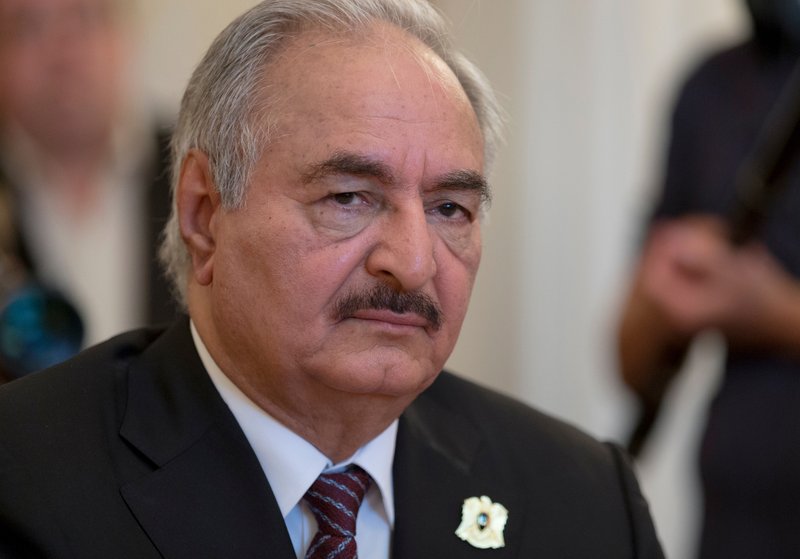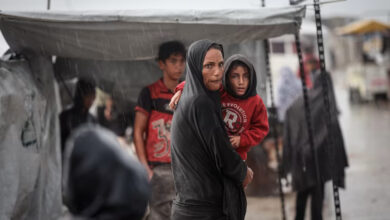
TRIPOLI/CAIRO (Reuters) — Libya’s internationally recognized government on Tuesday suspended talks hosted by the United Nations to halt warfare over the capital after eastern forces shelled Tripoli’s port, killing three people and almost hitting a highly explosive gas tanker.
The U.N. has been hosting in Geneva ceasefire talks between officers from the Tripoli government and the eastern-based Libya National Army (LNA), led by commander Khalifa Haftar. The two factions have been trying to take the capital in a near year-long campaign, displacing at least 150,000 people.
The talks had been agreed by foreign powers backing rival parties at a summit in Germany a month ago, an event that has not halted a war cutting oil exports by 1 million barrels a day.
Western countries have largely watched passively as Libya fell apart since helping remove Muammar Gaddafi in 2011, opening the door for regional powers such as the United Arab Emirates, Egypt and Turkey to back rival camps fighting for control.
The LNA on Tuesday shelled Tripoli port, saying first it had attacked a Turkish vessel bringing weapons but saying later it had hit an arms depot. Three civilians were killed and five wounded, the Tripoli forces said.
The attack came just as the U.S. ambassador Richard Norland was visiting Haftar in the first trip of a U.S. envoy to eastern Libya since the killing of the U.S. ambassador in a raid blamed on an Islamist militia in 2012.
In response to the LNA attack, the Tripoli-based Government of National Accord said in a statement it suspended its participation in ceasefire talks “until firm responses are taken against the attacker, and we will respond firmly to the attack in appropriate timing.”
“Negotiations don’t mean anything without permanent ceasefire guarantees returning the displaced people and the security of the capital and the other cities,” it added.
Tripoli port is a major gateway for food, fuel, wheat and other imports for the capital, which is home to the internationally recognized government. Heavy artillery fire could be heard at night.
PORT STRIKE
State oil firm NOC said it had urgently evacuated all fuel tankers from the port after a missile struck meters away “from a highly explosive liquefied petroleum gas (LPG) tanker discharging in the port”.
“The city does not have operational fuel storage facilities … the consequences will be immediate; hospitals, schools, power stations and other vital services will be disrupted,” NOC Chairman Mustafa Sanalla said in a statement.
Since January, Turkey has sent several ships carrying arms and heavy trucks to Tripoli and Misrata, another western port allied to the Tripoli government, diplomats say. It has also sent fighters from Syria’s civil war to defend Tripoli.
The LNA is allied to a parallel government in eastern Libya supported by the UAE, Egypt, Jordan and Russian mercenaries. France has also given some support.
Eastern ports and airports are out of range of the Tripoli forces and its Turkish drones.
Tuesday’s attack on the port unfolded as officers from the Tripoli forces and the LNA held a second round of indirect talks in Geneva to establish a permanent ceasefire. Both sides refused again to sit in the same room, U.N. Libya envoy Ghassan Salame said.
Salame added that he had received conditions from tribesmen allied to eastern forces to lift a blockade of eastern oil export ports, but said these were quite general and would have to be fleshed out in more U.N.-led talks in Geneva next week.
Reporting by Ahmed Elumami, Emma Farge, Ulf Laessing, Hani Amara, Ayman al-Warfalli and Hesham Abdul Khalek; Writing by Ulf Laessing; Editing by Mark Heinrich, Giles Elgood and Lisa Shumaker
Image: In this Aug. 14, 2017 file photo, rebel Libyan commander Khalifa Haftar, meets with Russian Foreign Minister Sergei Lavrov in Moscow, Russia (AP Photo/Ivan Sekretarev, File)




